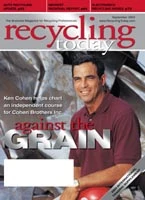Early on in life, we are usually confronted with a dilemma that helps
us learn that we "can’t have it both ways." We might wish, in some
situations, that we could cast off the burden of parental rules and oversight. But most of us conclude we wouldn’t want to give up the home, regular meals, medical care and allowance provided by our parents.
If opinion polls are accurate, America (if not the world) is full of people who still hope to "have it both ways." And sadly, there seems to be no shortage of politicians and corporate leaders willing to keep that alluring promise alive.
Americans may not sit back and reflect upon it, but as much as they bash their government, they still expect it to do a great deal. In addition to the common defense, even the most virulent anti-tax bashers expect passable roads, safe bridges, ports that are dredged and usable, criminal enforcement and prosecution, schools and universities and some degree of care for those incapable of caring for themselves.
Somewhere along the way, policy makers began to balloon the public’s expectations of what government could do well beyond these basic functions, and new roles for government were created as long as the public was willing to provide the funds. Predictably, this willingness reached its limits, and anti-tax platforms have now become more popular than platforms based on government largesse. But the tax rollback frenzy is creating unrealistic expectations of its own. The government remains the financier of last resort, and whether it is citizens’ relief for prescription medicines or corporate relief to petition the government to take up a trade dispute, even tax critics are not quite willing to see the government close up shop.
The recycling industry grapples with dueling expectations of its own. It wishes to be seen as "green" and part of the sustainable economy trend, yet it also thrives on the obsolete cast-offs of a free-spending society.
The environmental faction of the recycling industry can reflect on conflicting expectations as well. Resource reduction, translated into dollars and cents, can mean shrinking portions of the economy that provide a considerable percentage of the employment and tax base.
Owning a home is the American dream, and it is still considered by many as a good way for a middle class family or citizen to invest for the future. In many parts of California, however, this dream has become elusive. Many culprits have been cited—including a real estate bubble inflated during the dot-com frenzy and a homebuilding industry that focuses on high-margin custom homes—but other critics point to environmental regulations that have completely stifled new subdivisions, leaving Californians to outbid each other for existing single-family homes in growing parts of the state that attract immigrants from other nations and other parts of the U.S.
Sponsored Content
Labor that Works
With 25 years of experience, Leadpoint delivers cost-effective workforce solutions tailored to your needs. We handle the recruiting, hiring, training, and onboarding to deliver stable, productive, and safety-focused teams. Our commitment to safety and quality ensures peace of mind with a reliable workforce that helps you achieve your goals.
Sponsored Content
Labor that Works
With 25 years of experience, Leadpoint delivers cost-effective workforce solutions tailored to your needs. We handle the recruiting, hiring, training, and onboarding to deliver stable, productive, and safety-focused teams. Our commitment to safety and quality ensures peace of mind with a reliable workforce that helps you achieve your goals.
Sponsored Content
Labor that Works
With 25 years of experience, Leadpoint delivers cost-effective workforce solutions tailored to your needs. We handle the recruiting, hiring, training, and onboarding to deliver stable, productive, and safety-focused teams. Our commitment to safety and quality ensures peace of mind with a reliable workforce that helps you achieve your goals.
Sponsored Content
Labor that Works
With 25 years of experience, Leadpoint delivers cost-effective workforce solutions tailored to your needs. We handle the recruiting, hiring, training, and onboarding to deliver stable, productive, and safety-focused teams. Our commitment to safety and quality ensures peace of mind with a reliable workforce that helps you achieve your goals.
Sponsored Content
Labor that Works
With 25 years of experience, Leadpoint delivers cost-effective workforce solutions tailored to your needs. We handle the recruiting, hiring, training, and onboarding to deliver stable, productive, and safety-focused teams. Our commitment to safety and quality ensures peace of mind with a reliable workforce that helps you achieve your goals.
Sponsored Content
Labor that Works
With 25 years of experience, Leadpoint delivers cost-effective workforce solutions tailored to your needs. We handle the recruiting, hiring, training, and onboarding to deliver stable, productive, and safety-focused teams. Our commitment to safety and quality ensures peace of mind with a reliable workforce that helps you achieve your goals.
Sponsored Content
Labor that Works
With 25 years of experience, Leadpoint delivers cost-effective workforce solutions tailored to your needs. We handle the recruiting, hiring, training, and onboarding to deliver stable, productive, and safety-focused teams. Our commitment to safety and quality ensures peace of mind with a reliable workforce that helps you achieve your goals.
Having it both ways is always an attractive option, but it is not a realistic expectation to maintain. Tough choices lie ahead for voters, politicians and business decision-makers.
Get curated news on YOUR industry.
Enter your email to receive our newsletters.

Explore the September 2003 Issue
Check out more from this issue and find your next story to read.
Latest from Recycling Today
- Green Cubes unveils forklift battery line
- Rebar association points to trade turmoil
- LumiCup offers single-use plastic alternative
- European project yields recycled-content ABS
- ICM to host colocated events in Shanghai
- Astera runs into NIMBY concerns in Colorado
- ReMA opposes European efforts seeking export restrictions for recyclables
- Fresh Perspective: Raj Bagaria






